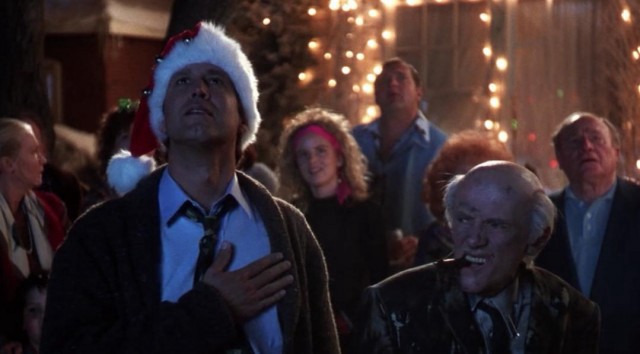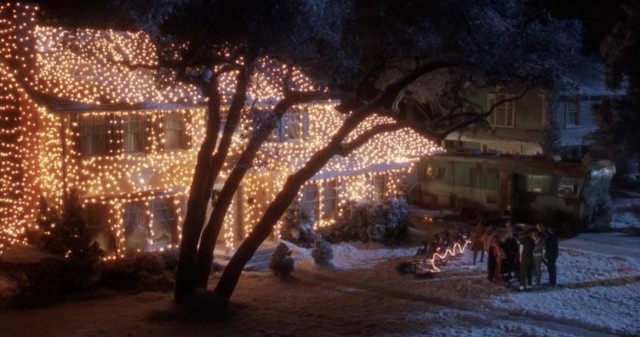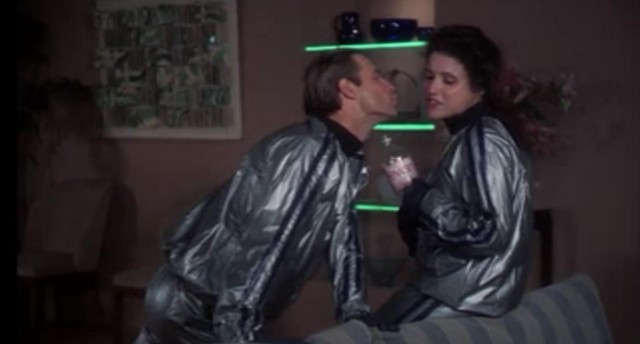‘National Lampoon’s Christmas Vacation’: A Portrait of Bourgeois Crisis
by Brooke Hatfield

For a white dude in America with a hot wife and a huge house and kids who aren’t in rehab and a job that presumably pays at least six figures, Clark Griswold sure has a lot of problems come Christmastime! His family is annoying! Putting up Christmas lights is hard! He might not be able to afford a pool with his bonus! In terms of economic landscape, National Lampoon’s Christmas Vacation has aged about as well as a pumpkin in a swamp.
The film is ostensibly about finding the true spirit of the season amid a hellish, slapstick descent into suburban holiday dysfunction, but the film’s “fun, old-fashioned Christmas” is remarkably steeped in wealth’s economic markers, which I’ll discuss in 2013 dollars.
For instance, Clark’s dream Christmas tree is a massive number that, considering it’s not precut and it has to be tied to his car (both of these usually cost extra) would likely retail for over $500.1
The Griswolds’ over-the-top light display, which encases their substantial two-story home with the density of Burt Reynolds’ chest hair, also doesn’t come cheap. Clark mentions that he has 250 strands of lights composed of 100 lights each. Based on the current going rate for a 100-bulb strand on Target’s website, just buying the lights would cost him in the neighborhood of $2,500.
And what about the energy cost to run those lights? Wired’s Rhett Allain is a brain genius who used a Watts Up? Pro Electricity Consumption Meter, algebraic formulas, and 1989 electricity rates to estimate that the Griswold’s light display cost $11/day. However, this figure is based on an estimate of 4,400 bulbs; if we apply Allain’s formula to the 25,000 bulbs Clark mentions, and if Clark runs his lights for four hours a day, it costs him $63/day to blind the neighborhood.

And now the plot twist that time has been least kind to: Will Clark get a holiday bonus so he can put in a pool?!?!?!2 In the moral universe of “National Lampoon’s Christmas Vacation” the bonus is a human right denied at the peril of the elite even though in the real world, per the United States Bureau of Labor Statistics, “bonus pay is mostly a feature of high-wage managerial and sales occupations.” I have literally gotten one bonus in my entire life, and it was a $25 gift card to Publix.
For a sizable chunk of us plebeians, bonuses don’t happen at all, much less in amounts that could conceivably fund a pool. And oh how Clark fetishizes that purchase; he keeps a brochure about it in his coat pocket and a model of it in his office, right next to photos of his children, KIDDING, THERE AREN’T ANY, ONLY POOL, FOREVER.
In a sun-drenched fantasy sequence, Clark daydreams about his family splashing about in that status-affirming lagoon. They’re quickly replaced by a stripteasing brunette, whose full reveal is interrupted by a nagging child. Sure, sometimes a pool is just a pool, but when viewed through a lens of suburban excess and a white-knuckled grip to traditional, 1950s American values, maybe it’s also a Hail Mary pass for a man who fears he’s careening toward impotence and irrelevance.
Despite the film’s intended broad appeal, it’s really a portrait of bourgeois crisis, specifically white bourgeois crisis (the sole character of color is a police chief who’s literally first seen opening a car door for a rich white woman), and it’s remarkably mean-spirited towards characters who deviate from the traditional “fun, old-fashioned” WASPy values Clark projects. The most affection Clark can muster for his redneck cousin Eddie and his family is a grudging paternalism that leads him to bankroll presents for Eddie’s poor, lip-fungus-y kids.

Conversely, the ultra-rich are also portrayed as “other.” Clark’s bosses are a monolithic borg; the way they’re shot and dubbed, they may as well goose step into each shot. Clark’s yuppie neighbors Todd and Margo are ostensibly in a similar tax bracket, but they shun a traditional aesthetic — they wear metallic tracksuits and decorate their house in the spirit of the album cover to Duran Duran’s Rio! They refer to Christmas trees as “corny and cliche”! Clearly they must be destroyed!
On Christmas eve, Clark finally receives his holiday bonus — entry in a jelly of the month club! Clark is not having it! And the resulting tirade is a beautiful freakout, one so transcendent that it almost justifies the widespread cultural appeal of Clark Griswold, a juvenile, mean-spirited sociopath motivated almost entirely by ego:
“If any of you are looking for any last-minute gift ideas for me, I have one. I’d like Frank Shirley, my boss, right here tonight. I want him brought from his happy holiday slumber over there on Melody Lane with all the other rich people and I want him brought right here…with a big ribbon on his head! And I want to look him straight in the eye, and I want to tell him what a cheap, lying, no-good, rotten, four-flushing, low-life, snake-licking, dirt-eating, inbred, overstuffed, ignorant, blood-sucking, dog-kissing, brainless, dickless, hopeless, heartless, fat-assed, bug-eyed, stiff-legged, spotty-lipped, worm-headed sack of monkey shit he is! Hallelujah! Holy shit! Where’s the Tylenol?”
Cousin Eddie is, as my grandmother might say, simple, so he takes this as a literal call to kidnap Clark’s boss, which he does. The film flirts with becoming radicalized here — could the Griswolds join the proletariat? Will the plot, laden as it is with the markings of the upper-class, improbably culminate in a searing indictment of late ’80s capitalism?
Nope! Instead Clark gives an impassioned speech about how employees depend on their bonuses so they can do things like buy pools. His boss is incredibly moved by the plight of these people of comfortable means, and in a fit of pay-us ex machina he not only reinstates bonuses, he ups them by 20 percent. (The boss even implies that his kidnapping was justified by his bogus, heartless decision to cancel bonuses.) In the resulting celebration, Clark is happier than we have ever seen him; he dances and smiles like a man who has never known pain.
The police show up, but everyone’s white and no one wants to press charges, so it all works out. The film ends with Clark standing outside his house looking up at the stars, alone as perhaps he always has been. The film’s final words — “I did it” — are a final display of his ego before the credits roll. As the screen fades to black, it’s hard not to wonder how long that pool’s going to hold him over.
1. This is somewhat anecdotal and based on an estimate from a friend whose family runs the finest Christmas tree farm in Hall County, Georgia.
2. Somewhat notably, Clark also doesn’t tell his wife about the $700 down payment he’s already put down on the pool ($1,333.78 in 2013 dollars, per this inflation calculator), which is why he’s stressed, and also why he’s an asshole.
Brooke Hatfield knows in her heart that the Rap Genius annotation of Outkast’s “Player’s Ball” is the real reason for the season. This piece was originally written for Scene Missing Magazine’s live show.
Support The Billfold
The Billfold continues to exist thanks to support from our readers. Help us continue to do our work by making a monthly pledge on Patreon or a one-time-only contribution through PayPal.
Comments